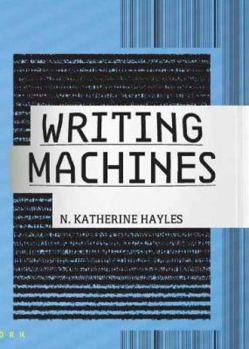Writing Machines
Select Format
Select Condition 
Book Overview
A pseudo-autobiographical exploration of the artistic and cultural impact of the transformation of the print book to its electronic incarnations.
Tracing a journey from the 1950s through the 1990s, N. Katherine Hayles uses the autobiographical persona of Kaye to explore how literature has transformed itself from inscriptions rendered as the flat durable marks of print to the dynamic images of CRT screens, from verbal texts to the diverse sensory modalities of multimedia works, from books to technotexts.
Weaving together Kaye's pseudo-autobiographical narrative with a theorization of contemporary literature in media-specific terms, Hayles examines the ways in which literary texts in every genre and period mutate as they are reconceived and rewritten for electronic formats. As electronic documents become more pervasive, print appears not as the sea in which we swim, transparent because we are so accustomed to its conventions, but rather as a medium with its own assumptions, specificities, and inscription practices. Hayles explores works that focus on the very inscription technologies that produce them, examining three writing machines in depth: Talan Memmott's groundbreaking electronic work Lexia to Perplexia, Mark Z. Danielewski's cult postprint novel House of Leaves, and Tom Phillips's artist's book A Humument. Hayles concludes by speculating on how technotexts affect the development of contemporary subjectivity.
Writing Machines is the second volume in the Mediawork Pamphlets series.






